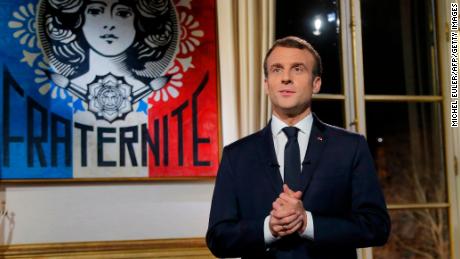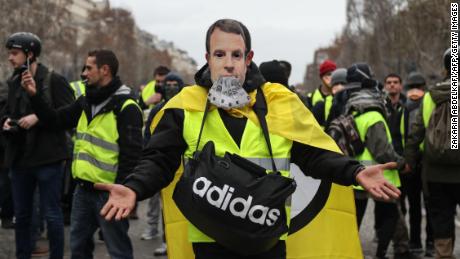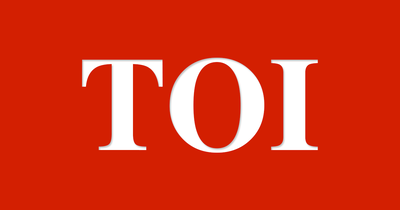About 50,000 people demonstrated, according to Interior Minister Christophe Castaner. Large gatherings were held in Paris, Bordeaux and Marseilles.In Paris, 3,500 people participated in protests on Saturday, much higher than the 800 who took to the streets last week, police said. At least 34 people were taken in for questioning in the capital city.Benjamin Griveaux, government spokesman, confirmed that he and his team had to evacuate his office in Paris after demonstrators broke into his courtyard by knocking down the door with construction machinery.Violence was reported in Montpellier and Troyes, where demonstrators tried to enter prefectures, and in Avignon, where some attempted to break into the Court of Justice. Violence was also reported in Beauvais, authorities said.The protests are named after the yellow high-visibility jackets French motorists must carry in their vehicles.They have morphed from dissent over rising gas prices and eco-taxes into a broader demonstration against President Emmanuel Macron and his government, and tensions between the metropolitan elite and rural poor. "I call on everybody to be responsible and respect the rule of law," Castaner said on Twitter.Castaner said he gathered local police officials for a video conference "as tensions and violence have been witnessed in Paris and in a few other cities."Last weekend, an estimated 32,000 protesters took to the streets. There have been some protests since the year began but mostly they have been modest demonstrations on roads and roundabouts.Saturday's protests are the first big gatherings of the year.
"I call on everybody to be responsible and respect the rule of law," Castaner said on Twitter.Castaner said he gathered local police officials for a video conference "as tensions and violence have been witnessed in Paris and in a few other cities."Last weekend, an estimated 32,000 protesters took to the streets. There have been some protests since the year began but mostly they have been modest demonstrations on roads and roundabouts.Saturday's protests are the first big gatherings of the year.
A government under pressure
In his New Year's address, Macron made reference to the "yellow vest" movement without naming it. He acknowledged anger against injustice but said hateful speech would not be tolerated. Macron said France "wants to build a better future" while imploring people to respect each other.In December, Macron pledged to increase the minimum wage and get rid of new pension taxes, a move that didn't appease the anger of some of the protesters.Ten people have died in connection with the protests, with most deaths taking place in traffic accidents related to blockades in November and December.
He acknowledged anger against injustice but said hateful speech would not be tolerated. Macron said France "wants to build a better future" while imploring people to respect each other.In December, Macron pledged to increase the minimum wage and get rid of new pension taxes, a move that didn't appease the anger of some of the protesters.Ten people have died in connection with the protests, with most deaths taking place in traffic accidents related to blockades in November and December.
CNN's Katie Polglase wrote from London while Joe Sterling wrote from Atlanta.
Original Article
About 50,000 people demonstrated, according to Interior Minister Christophe Castaner. Large gatherings were held in Paris, Bordeaux and Marseilles.In Paris, 3,500 people participated in protests on Saturday, much higher than the 800 who took to the streets last week, police said. At least 34 people were taken in for questioning in the capital city.Benjamin Griveaux, government spokesman, confirmed that he and his team had to evacuate his office in Paris after demonstrators broke into his courtyard by knocking down the door with construction machinery.Violence was reported in Montpellier and Troyes, where demonstrators tried to enter prefectures, and in Avignon, where some attempted to break into the Court of Justice. Violence was also reported in Beauvais, authorities said.The protests are named after the yellow high-visibility jackets French motorists must carry in their vehicles.They have morphed from dissent over rising gas prices and eco-taxes into a broader demonstration against President Emmanuel Macron and his government, and tensions between the metropolitan elite and rural poor. "I call on everybody to be responsible and respect the rule of law," Castaner said on Twitter.Castaner said he gathered local police officials for a video conference "as tensions and violence have been witnessed in Paris and in a few other cities."Last weekend, an estimated 32,000 protesters took to the streets. There have been some protests since the year began but mostly they have been modest demonstrations on roads and roundabouts.Saturday's protests are the first big gatherings of the year.
"I call on everybody to be responsible and respect the rule of law," Castaner said on Twitter.Castaner said he gathered local police officials for a video conference "as tensions and violence have been witnessed in Paris and in a few other cities."Last weekend, an estimated 32,000 protesters took to the streets. There have been some protests since the year began but mostly they have been modest demonstrations on roads and roundabouts.Saturday's protests are the first big gatherings of the year.
A government under pressure
In his New Year's address, Macron made reference to the "yellow vest" movement without naming it. He acknowledged anger against injustice but said hateful speech would not be tolerated. Macron said France "wants to build a better future" while imploring people to respect each other.In December, Macron pledged to increase the minimum wage and get rid of new pension taxes, a move that didn't appease the anger of some of the protesters.Ten people have died in connection with the protests, with most deaths taking place in traffic accidents related to blockades in November and December.
He acknowledged anger against injustice but said hateful speech would not be tolerated. Macron said France "wants to build a better future" while imploring people to respect each other.In December, Macron pledged to increase the minimum wage and get rid of new pension taxes, a move that didn't appease the anger of some of the protesters.Ten people have died in connection with the protests, with most deaths taking place in traffic accidents related to blockades in November and December.
CNN's Katie Polglase wrote from London while Joe Sterling wrote from Atlanta.
Original Article












